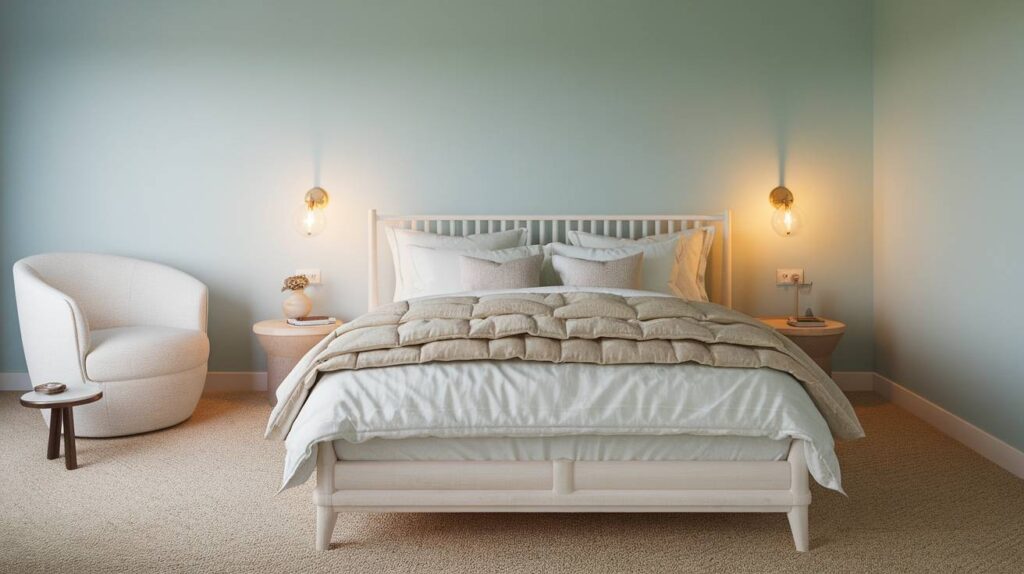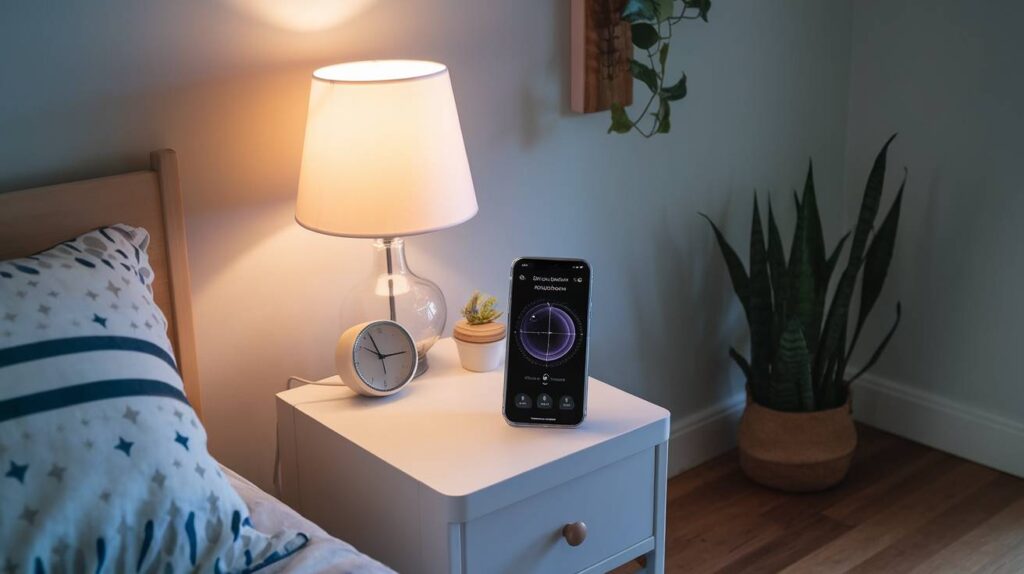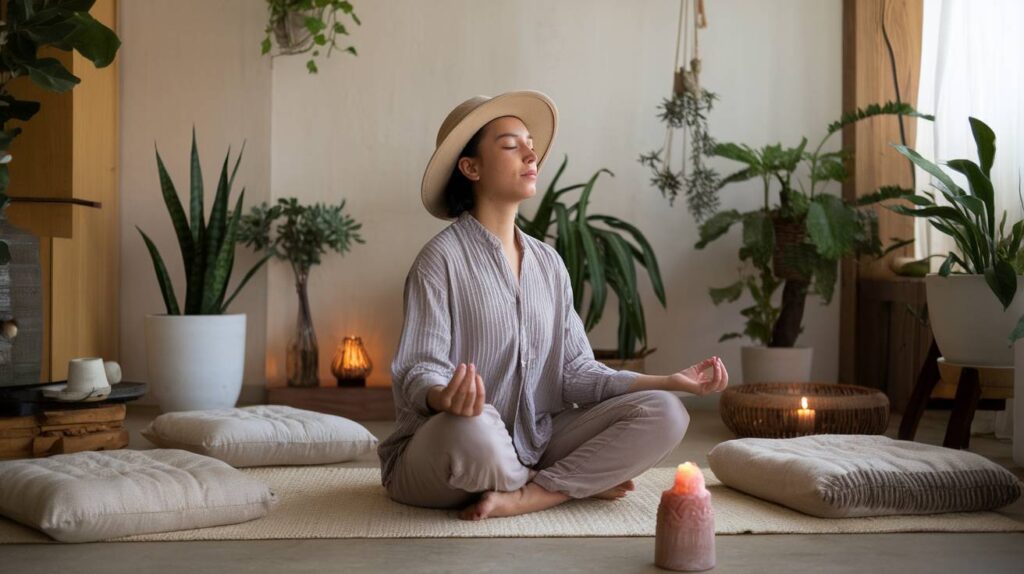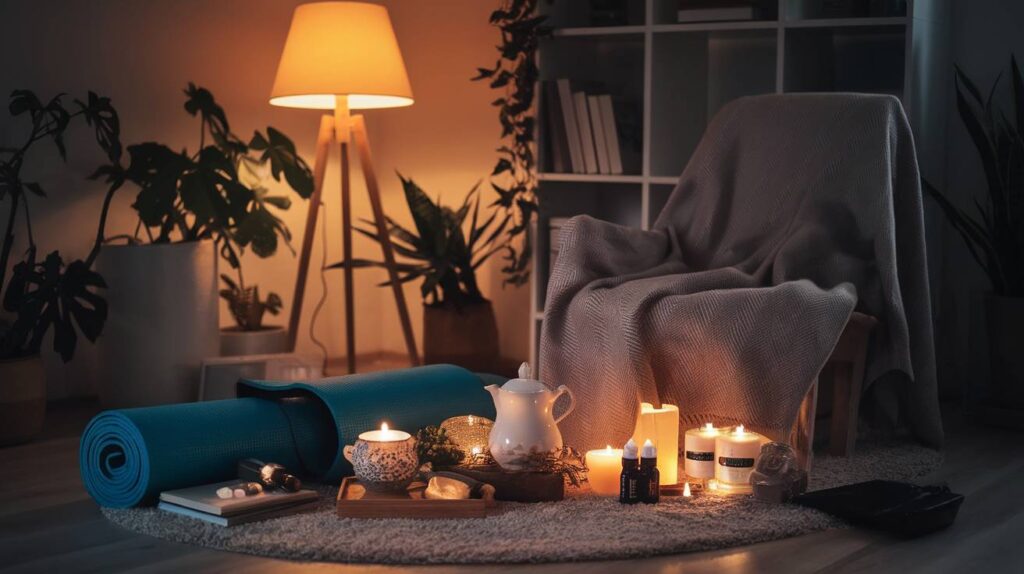Struggling to catch those elusive Zs? You’re not alone. In our fast-paced world, quality sleep often takes a backseat, affecting everything from mood to physical health. Imagine waking up refreshed, energized, and ready to tackle the day—sounds dreamy, right? This guide dives deep into sleep hygiene best practices, blending nature’s remedies with proven strategies to enhance your nightly rest. Whether you’re a night owl, a busy parent, or someone battling sleeplessness, discover how to transform your sleep routine and embrace the rejuvenating power of a good night’s sleep.
Main Key Takeaways
- Establish a Consistent Sleep Schedule: Maintaining regular bedtimes and wake-up times reinforces your body’s internal clock, enhancing sleep quality.
- Create a Sleep-Conducive Environment: Optimize your bedroom with appropriate temperature, minimal light, and quietness to promote uninterrupted sleep.
- Incorporate Relaxation Techniques: Practices like meditation, yoga, and deep breathing can significantly reduce stress, making it easier to drift off.
- Monitor Diet and Exercise: Limiting caffeine and alcohol intake while engaging in regular physical activity supports healthier sleep patterns.
- Utilize Natural Supplements and Remedies: Melatonin, herbal teas, and essential oils can aid in regulating sleep cycles and creating a calming pre-sleep routine.
Importance of Sleep
Understanding the Impact of Quality Sleep
Getting good sleep is like hitting the recharge button on your mind and body. While you’re snoozing, the magic happens – your body fixes itself, muscles bulk up, and hormones get in line. It’s not just about how long you sleep but diving through the right stages like deep sleep and REM, which makes a difference. Good sleep sharpens your noggin, lifts your mood, and boosts your physical game.
“A good laugh and a long sleep are the best cures in the doctor’s book.” – Irish Proverb
Benefits of Quality Sleep:
- Sharpens thinking and memory
- Lifts your spirits and keeps emotions in check
- Helps your body stay strong and heal
- Keeps your immune system working like a champ (sleep immune system)
Effects of Sleep Deprivation
Skipping on shut-eye? It takes a toll on your body, mind, and mood. Chronic sleeplessness can set off a host of health alarms, raising the stakes for diseases like hypertension, diabetes, and heart trouble. Mentally, it leaves you foggy, irritable, and more prone to stress and anxiety than you’d like.
Common Effects of Sleep Deprivation:
| Health Area | Effects of Missing Sleep |
|---|---|
| Physical Health | Sluggish immune system, piling on pounds, greater odds of serious illnesses |
| Mental Health | Brain fog, memory glitches, bad call-making |
| Emotional Health | Mood rollercoaster, ramped-up stress and nerves, feeling down (sleep mental health) |
Folks with long-term sleep woes might find relief in natural sleep cures (natural sleep aids) or by chatting with a healthcare pro. Figuring out why kip time is a big deal and tackling sleepless nights can make living so much better.
Building Your Ideal Sleep Routine
Getting the best outta your bedtime hours can make a world of difference in how you feel every day. Here’s how to whip up a snooze schedule that sets you up for sound sleep.
“Your sleep environment is the foundation of transformative rest. Make it a sanctuary.” – Dr. Matthew Walker
Finding Your Bed and Rise Rhythm
Keeping your morning and bedtime the same every day is key to keeping your body’s inner clock ticking smoothly. Hitting the sack and popping out of bed at similar times boosts sleep quality and makes sure you’re well-rested. This routine locks in a steady circadian rhythm, helping you drift off and rise like a breeze.
| Age Group | Sleep Sweet Spot (Hours) |
|---|---|
| Teenagers (14-17) | 8-10 |
| Adults (18-64) | 7-9 |
| Older Folks (65+) | 7-8 |
For those juggling odd hours, like night shifts, peek at our piece on sleep cycles.

Crafting a Chill-Down Routine
Having a soothing wind-down before bed tells your mind and body it’s downtime. Think about reading, sinking into a warm bath, or some easy-going yoga. These moves ease you into relaxation mode, readying you for a good night’s rest.
Sprinkle in some calmness with meditation specifically for sleep or sleep-time yoga to ease your thoughts and file away stress. Here’s some soothing stuff to try before hitting the hay:
- Flip through a book
- Turn up some mellow tunes
- Try deep breathing exercises
- Scribble down thoughts or tomorrow’s to-dos
Setting Up Your Sleep Sanctuary
Where you snooze is a biggie. Your sleep zone should feel like a cloud of comfort and calm. Things that matter? Your mattress’s plushness, room’s coolness, and overall vibe. Throw in blackout curtains, keep it a bit chilly, and cut the noise to up your sleep-game.
| Factor | Sweet Spot |
|---|---|
| Room Temp | 60-67°F |
| Sounds | Quiet as a mouse |
| Light | Total darkness |
Want more tips on sprucing up your sleep cave? Check out our takes on bedroom optimization for sleep and choosing the best mattresses for health.
Stitching together these bedtime habits gets you better sleep habits and a shot at better health. And don’t miss our sleep hygiene pointers to polish up your nightly norms even more.
The Role of Technology
Let’s be real—tech’s got its fingers in every pie, including the one that affects how well we catch our Z’s. We’ll have a chat about dialing back those pre-bed screen sessions and how handy sleep-tracking gadgets can give our snooze a boost.
Limiting Screen Time Before Bed
If you find yourself scrolling Instagram at 11 PM, you’re not alone, but your sleep is probably suffering. That blue glow coming from your phone or that late-night Netflix session messes with melatonin, the sleepy-time hormone. Cutting down on screen time could help set you up for a night of sweet slumber.
Try this game plan to ease off the screens before hitting the hay:
| Time Before Bed | Suggested Action |
|---|---|
| 2 hours | Say goodbye to phones and tablets |
| 1 hour | Chill out with a book or a warm bath |
| 30 minutes | Start winding down with some meditating or gentle stretching |
Stick to these tips, and you might just find it easier to drift off to dreamland. For more advice on setting up a soothing bedtime ritual, peep our article on sleep hygiene.

Using Sleep-Tracking Apps and Devices
Sleep-tracking apps and gadgets can be like having a personal sleep coach, showing you how long you sleep, how deep you snooze, and where it all goes wonky. Then, you can tweak your habits based on what you learn.
Sleep tech perks:
- Peek at Sleep Stages: Check how much time you’re spending in light, deep, and dream sleep.
- Spot the Disruptions: See what’s waking you up and messing with your rest.
- Get Tips Just for You: Follow advice made for improving your sleep game.
| Feature | Why It Rocks |
|---|---|
| Sleep Stage Peek | Dives into the different snooze phases |
| Disruption Detector | Highlights what’s stopping you from sleeping tight |
| Custom Sleep Advice | Gives you tailor-made snooze strategies |
For more on how to use these tools, check out our piece on the best sleep trackers.
Using technology smartly can help balance the coolness of having gadgets with the need for some serious shut-eye. Whether you’re cutting back on screen time or getting cozy with a sleep tracker, tech can be your buddy in building better sleep habits and staying well.
Lifestyle Factors
Diving into the bits and bobs of lifestyle factors can seriously affect how well you catch those z’s. Let’s chat about moving that body, chilling out that brain, and keeping tabs on your caffeine and booze intake.
Getting Your Move On
Working up a sweat works wonders for your snooze time. Breaking a sweat helps keep your body’s clock ticking just right and makes bedtime more peaceful. Even sneaking in some mellow exercise into your day can work like a charm.
| Type of Activity | How Often | How Long |
|---|---|---|
| Aerobic (like walking, cycling) | 3-4 days a week | 30-40 mins |
| Pumping Iron | 2-3 days a week | 20-30 mins |
| Yoga (try Yoga for sleep) | Every day | 15-20 mins |
Want the scoop on how exercise can fine-tune your sleep? Peek at our piece on exercise and sleep.

Keeping Cool and Calm
Stress and sleep are not besties. When life’s got you all knotted up, sleep can become a nightmare. A little calm and some stress-busting mojo can turn things around for your dreamland adventures.
Try these chill pills:
- Meditation: Mindfulness or meditation for sleep can work like magic for the mind.
- Deep Breaths: Get into the groove of deep breathing to zap anxiety.
- Journaling: Scribbling your thoughts down before tucking in can help hit the off switch.
We’ve got more tricks to tackle stress in our stress management for sleep article.
Keeping an Eye on Caffeine and Booze
Both caffeine and drinks can jolt your sleep game. Caffeine amps you up, so sipping it close to bedtime isn’t doing you any favors. Alcohol, though relaxing at first, can mess up your sleep cycle.
Caffeine
Ease up on caffeine by:
- Cutting it out at least 6 hours before your head hits the pillow.
- Watching how much you sip throughout the day.
| Source | Average Caffeine (mg) |
|---|---|
| Coffee (8 oz) | 95 |
| Tea (8 oz) | 47 |
| Soda (12 oz) | 34 |
Alcohol
To keep alcohol from messing your sleep:
- Drink less in the evening.
- Give your body some time to process alcohol before sleep.
Want to know how what you eat affects your sleep? Check out our article on diet and sleep.
Making these tweaks in your daily routine can boost your sleep time by leaps and bounds. Check how active you are, calm the mind, and keep an eye on what you sip to find your way to the perfect rest. Dig into more tips in sleep and wellness and sleep hygiene.
Sleep Hygiene Tips
Mastering the fine art of drifting off into dreamland can be a real game-changer for your nightly snooze and overall vibe. Here’s a bunch of solid advice that’ll help you conquer your sleep blues.
Practicing Good Sleep Hygiene Habits
Good sleep routines make way for peaceful, uninterrupted slumber, giving a boost to your day-to-day health. Check out these helpful nuggets:
- Stick to a schedule: Try hitting the hay and getting up at the same time each day. Yep, even when Saturday rolls around.
- Keep naps short: If you need to snooze during the day, limit it to 20-30 minutes.
- Move more, snooze better: Regular workouts can lead to better sleep, but don’t go breaking a sweat too close to your bedtime. Check out our guide on exercise and sleep for the lowdown.
- Set the scene: Make sure your bedroom feels comfy—cool, dark, and quiet. More tips? Head over to our article on bedroom optimization for sleep.
Avoiding Heavy Meals Before Bed
What’s on your plate before bedtime can mess with your snooze-o-rama. Being mindful with what you munch on before you hit the sack is key.
- Timing matters: Try to wrap up your dinner 2-3 hours before lights out.
- Choose wisely: Steer clear of big, spicy, or acidic meals that could have your tummy rumbling all night.
| Meal Timing | Recommended Time Before Bed |
|---|---|
| Last big meal | 2-3 hours |
| Light snacks | 1 hour |
Want the full scoop on how your eats affect your zzz’s? Check out our piece on diet and sleep.

Establishing a Wind-Down Period
Winding down like a pro helps clue your body and brain in that it’s time for some shut-eye. Add some chill activities into your evening routine to get the message across.
- Chill activities: Do something relaxing like reading, listening to mellow tunes, or get your zen on with meditation for sleep.
- Ditch the screens: Avoid those glowing gadgets at least an hour before bed. Peek at our thoughts on best sleep apps for tech that won’t keep you counting sheep.
- Create a bedtime ritual: Set up a consistent bedtime routine to remind your head it’s go time for snoozing.
Follow these sleep tips and you’ll be crafting the ultimate sleep schedule in no time. Hungry for more? Browse our sources on sleep hygiene and sleep and wellness.
Seeking Professional Help
Sometimes, even putting your head on the softest pillow might not grant you a ticket to dreamland. If sleepy-time struggles persist, it might be time to holler for the professionals. Knowing when to reach out and exploring natural sleepy-time tricks can change the game in tackling those sleep woes.
When to Consult a Healthcare Provider
Some cases warrant calling in the big guns—a.k.a. your healthcare provider. Persistent sleep struggles might hint at something deeper going on. Here’s when a doc’s advice is the real deal:
- Insomnia that’s overstayed its welcome for a month or more
- Sleeping beauty syndrome (a.k.a. excessive daytime sleepiness)
- Snoring as loud as a chainsaw, especially with breathing pauses
- Freaky changes in sleep patterns
- Chronic pain, anxiety, or depression crashing your sleep party
- Health conditions making sleep as elusive as Bigfoot
- Extreme tiredness even with a night of shut-eye
Doctors can check these signs and suggest treatments or send you to a sleep expert for more digging. To know more about how sleep messes with your brain, check out sleep and mental health.
| Symptom | When to Seek Help |
|---|---|
| Insomnia | Over one month |
| Daytime sleepiness | Too much to handle |
| Snoring + breathing pauses | Regular offender |
| Sleep pattern changes | Unexplainable |
| Pain, anxiety disrupting sleep | Always crashing the party |
| Health conditions affecting sleep | Sleep routine not cutting it |
Exploring Natural Remedies for Sleep
For some folks, nature’s got the goods for dozing off without diving into the medicine cabinet. Check these natural hacks for a slumber makeover:
- Herbal Teas:
Grab a cup of chamomile or valerian root tea to offer some chill vibes before bed.
- Essential Oils:
Use essential oils like lavender and chamomile to turn your sleep space into a zen den. More on oils in our essential oils for sleep article.
- Yoga and Meditation:
Do a few gentle yoga stretches or a quick meditation to send stress packing before bed. Find tips in yoga for sleep.
- Routine Tweaks:
Keep it consistent—same bedtime, same wake-up time—and stick to it. Eat smart, watch caffeine—these small changes make a big difference. More in diet and sleep. - Natural Supplements:
Melatonin can give your sleep cycles a tune-up, especially handy for shift workers or jet setters.

| Natural Remedy | Benefit |
|---|---|
| Herbal Teas (Chamomile, Valerian) | Chill-out vibes |
| Essential Oils (Lavender, Chamomile) | Zen atmosphere |
| Yoga and Meditation | Send stress packing |
| Routine Tweaks | Reinforce body clock |
| Natural Supplements (Melatonin) | Sleep cycle tune-up |
Mixing nature’s touches with a doctor’s know-how might just help you ace the sleep game. For more tips on setting up your sleep zone, visit our sleep hygiene guide.
Figuring out when to get help and trying out these natural tips could make catching those Zs easier than ever.
Shaping Your Sleep Habits
Getting that perfect night’s rest can boost how you feel and function. But remember, your sleep needs might shift as you go through life, or just because you’re you.
Shifting Your Sleep with Life’s Curveballs
As we cruise through life, our snooze patterns might take a turn. Tweaking how you catch those Z’s during different life phases can give your sleep quality a lift.
Youngsters and Teens
Kids and teens? They thrive on more sleep compared to the grown-ups. A rock-solid bedtime and wake-up call can work wonders.
| Age Group | Recommended Sleep (hours) |
|---|---|
| Infants (0-1 year) | 12-16 |
| Toddlers (1-2 years) | 11-14 |
| Kids (3-5 years) | 10-13 |
| School-age (6-12 years) | 9-12 |
| Teens (13-18 years) | 8-10 |
Young Adults in the Hustle
If you’re in the young-adult camp, shooting for 7-9 hours is your jam. Balancing work, hanging with friends, and “me-time” is the juggling act here. Mixing in exercise can fine-tune your sleep to primo quality.
Seasoned Sleepers
As we get older, we might start waking at rooster-time. Ample rest means hitting about 7-8 hours a night. To help, dabbling with natural sleep aids and setting a chill vibe can make a world of difference.
Customizing Your Sleep for Sweet Dreams
Got unique sleep quirks? Crafting a bedtime routine that speaks to your soul can help you snooze your best.
Cracking Your Sleep Code
Understanding your snooze cycles is like having a cheat sheet to waking up energised. Check out all the deets in our sleep cycles breakdown.
| Sleep Stage | Duration (minutes) |
|---|---|
| Light Sleep | 60-70 |
| Deep Sleep | 20-40 |
| REM Sleep | 10-20 |
Carving Out a Chill Bedtime Routine
A calming wind-down routine primes you for a night of sweet slumber. Activities like meditation for sleep or yoga for sleep are fab choices.
Crafting the Coziest Sleeping Space
Never underestimate the power of a comfy sleeping nook. Dive into our bedroom tips for crafting a snooze-inducing environment.
Tuning and tailoring your snooze routine to match your life’s rhythm can support top-notch sleep habits and an all-around feel-good vibe. For more snooze-savvy advice, check out our piece on sleep hygiene.
Conclusion
Embracing effective sleep hygiene is more than just a nightly ritual—it’s a cornerstone of overall health and well-being. By establishing a consistent sleep schedule, creating a serene sleep environment, and integrating relaxation techniques into your routine, you set the stage for restful nights and energized days. Don’t underestimate the power of natural remedies and mindful lifestyle choices in enhancing your sleep quality. Remember, everyone’s sleep needs are unique, so tailor these strategies to fit your personal rhythms and challenges. Whether you’re tweaking your bedtime habits or seeking professional advice for persistent sleep issues, taking proactive steps towards better sleep can transform your life. Prioritize your rest, and unlock the myriad benefits of truly restorative sleep.
FAQs
What is sleep hygiene and why is it important?
Sleep hygiene refers to practices and habits that promote consistent, uninterrupted, and quality sleep. It’s essential because good sleep hygiene enhances overall health, boosts mood, sharpens memory, and strengthens the immune system.
How can I create a better sleep environment?
Optimize your bedroom by keeping it cool (60-67°F), dark, and quiet. Invest in a comfortable mattress, use blackout curtains, minimize noise with earplugs or white noise machines, and remove electronic devices to create a serene sleep sanctuary.
What are some effective relaxation techniques before bed?
Effective relaxation techniques include meditation, yoga for sleep, deep breathing exercises, journaling, and taking a warm bath. These activities help reduce stress and signal to your body that it’s time to wind down.
Are natural supplements like melatonin safe to use?
When used correctly, natural supplements like melatonin can be safe and effective for regulating sleep cycles. However, it’s advisable to consult with a healthcare provider before starting any new supplement, especially if you have underlying health conditions or are taking other medications.
How does exercise impact sleep quality?
Regular physical activity improves sleep quality by reducing stress, increasing physical fatigue, and regulating the body’s internal clock. Aim to exercise at least 3-4 times a week, but avoid intense workouts close to bedtime.
Resources
- National Sleep Foundation
- Mayo Clinic on Sleep Hygiene
- Harvard Health – Healthy Sleep Tips
- Sleep Research Society
- American Academy of Sleep Medicine
Recommended Products
- Melatonin Supplements
Enhance your sleep cycle naturally with high-quality melatonin capsules. - Chamomile Herbal Tea
Wind down your evenings with soothing chamomile tea. - Lavender Essential Oil
Create a calming atmosphere with pure lavender essential oil. - Weighted Blanket
Experience deeper relaxation and better sleep with a weighted blanket. - Sleep Tracking Device
Monitor your sleep patterns and improve sleep quality with advanced sleep trackers. - Blackout Curtains
Ensure complete darkness in your bedroom to promote uninterrupted sleep. - Yoga for Sleep Mat
Practice gentle yoga stretches before bed with a comfortable yoga mat. - White Noise Machine
Block out disruptive sounds with a soothing white noise machine. - Comfortable Mattress Topper
Upgrade your sleep surface for maximum comfort and support. - Sleep Mask
Enhance your sleep environment by keeping light at bay with a soft sleep mask.
Final Thoughts
Achieving quality sleep is a journey that intertwines various aspects of your lifestyle and environment. By implementing these sleep hygiene best practices, you not only enhance your nightly rest but also pave the way for improved physical health, mental clarity, and emotional stability. Remember, small changes can lead to significant improvements—whether it’s adjusting your bedtime, refining your sleep space, or embracing relaxation techniques. Listen to your body’s needs, stay consistent, and don’t hesitate to seek professional guidance if sleep challenges persist. Embrace these strategies, and unlock the transformative power of restorative sleep for a healthier, happier you.








